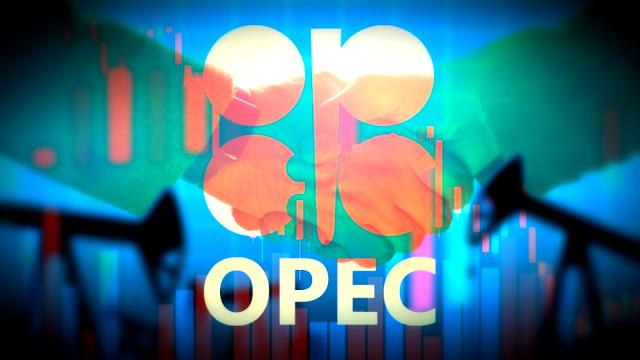
(Source: Shutterstock.com)
OPEC plus and its allies agreed June 6 to prolong historic production cuts through July after oil ministers from the OPEC countries, as well as other producers led by Russia, met by video conference.
OPEC+ had initially agreed in April that it would cut supply by 9.7 MMbbl/d, which represents some 10% of the world’s overall supply, during May and June in an effort to stabilize the oil market that had collapsed due to the coronavirus crisis.
UPDATE:
Saudi Arabia to End Voluntary Cuts on Top of OPEC+ Pact
OPEC+ has decided to extend its current cuts for an additional month till the end of July at 9.6 MMbbl/d, excluding Mexico, which ceased to pursue its commitments towards the agreement, Dr. Yousef Alshammri, CEO of CMarkits, told Hart Energy. “Mexico has cited its inability to continue shutting its fields which has cost the country thousands of jobs,” he explained.
“Furthermore, the group has agreed to hold its Joint OPEC-Non-OPEC Ministerial Monitoring Committee meeting on a monthly basis, to monitor price fluctuations, demand recovery and adjust productions when needed,” Alshammari said.
Despite the partial recovery of oil prices, the decision to continue extending cuts for a month or perhaps longer shows the concern of large oil producers that the oil market could fall apart again.
During the meeting, leaders of major oil producers expressed dismay at the situation of the global energy market. While Russian Energy Minister Alexander Novak called April “the worst month in history” for the global oil market, the Saudi Oil Minister Abdulaziz bin Salman, said he remained shocked by the day in April when U.S. oil futures plunged below zero.
According to a report by the Associated Press, Algerian Oil Minister and current OPEC president Mohamed Arkab warned meeting attendees that the global oil inventory would rise to 1.5 billion barrels by the middle of this year. “Despite the progress to date, we cannot afford to rest on our laurels,” Arkab said. “The challenges we face remain daunting.”
Compliance
“Effective compliance is vital if we are to secure the hard-won stability in the global oil market and restore confidence in the unity and effectiveness of the entire group,” Prince Abdulaziz bin Salman said during the meeting.
Compliance has been a key issue for several OPEC members, especially for Iraq and Nigeria, which reduced output by only half of their commitments. Although both countries agreed to make up for their backlog reduction, there was skepticism among members if the two countries would curb output, which they need to support their economies.
“It is expected that Iraq will fully comply by July and will cut substantially to compensate for its missing targets of 600,000 bbl/d on top of its 1 million bbl/d commitment. Furthermore, voluntary cuts of Saudi Arabia, UAE and Kuwait will not continue through July,” Alshammari explained.
Impact on global oil markets
“Under the current agreement extension, we expect markets to be undersupplied by around 2.09 MMbbl/d in July, which will increase the rate of withdrawal from inventories to bring them down to pre-crisis levels by December 2020,” Alshammari said.
He added that prices will continue rallying throughout the month of June, averaging at around $43/bbl for Brent and $30/bbl for WTI.
“Markets are expected to be undersupplied even if the [OPEC+] group decides to roll back its cuts in August. Yet, a price rally could be limited to $50 to 55/bbl as an increase in prices will lead to increased supplies from North America by the end of this year,” Alshammari explained.
While oil prices have partially recovered, they are still well below the operating costs for most U.S. shale producers as shutdowns, layoffs and cost-cutting continue across the country.
“I applaud OPEC-plus for reaching an important agreement today which comes at a pivotal time as oil demand continues to recover and economies reopen around the world,” U.S. Energy Secretary Dan Brouillette wrote on Twitter after the announcement of extended production cuts.
Recommended Reading
E&P Highlights: April 22, 2024
2024-04-22 - Here’s a roundup of the latest E&P headlines, including a standardization MoU and new contract awards.
E&P Highlights: March 25, 2024
2024-03-25 - Here’s a roundup of the latest E&P headlines, including a FEED planned for Venus and new contract awards.
Deepwater Roundup 2024: Offshore Europe, Middle East
2024-04-16 - Part three of Hart Energy’s 2024 Deepwater Roundup takes a look at Europe and the Middle East. Aphrodite, Cyprus’ first offshore project looks to come online in 2027 and Phase 2 of TPAO-operated Sakarya Field looks to come onstream the following year.
E&P Highlights: March 4, 2024
2024-03-04 - Here’s a roundup of the latest E&P headlines, including a reserves update and new contract awards.
E&P Highlights: March 15, 2024
2024-03-15 - Here’s a roundup of the latest E&P headlines, including a new discovery and offshore contract awards.





